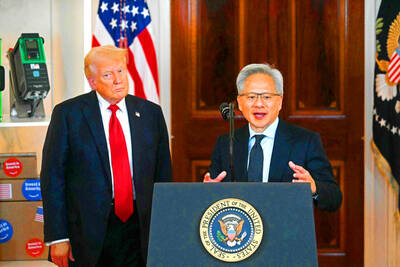BenQ Corp (明基) said yesterday that it planned to gradually downsize two cellphone plants in Taiwan and reduce its workforce in Europe as part of a greater restructuring project aimed at reversing its massive losses since taking over Siemens AG's handset unit.
"This is part of our restructuring plan. We plan to move our mobile phone manufacturing over time to a Chinese factory," BenQ spokesman Eric Yu (游克用) said in a telephone interview.
Yu said the Taoyuan factory would be transformed into a handset research and development center by the end of the year.
Yu's remarks came amid market speculation that the company is struggling to rein in costs and attract consumers with its handsets.
BenQ's restructuring plan is to spin off its non-handset manufacturing units from the brandname business, chairman Lee Kun-yao (李焜耀) told investors last month.
In the initial stage, more than 100 employees would leave their jobs by the end of the year, or about one-fifth of the workforce in its Taoyuan plants, Yu said.
BenQ is also encouraging its Taiwanese staff to work in other manufacturing sites, Yu said. It also plans to sell equipment, he said, without giving further details.
However, it has no plan to sell all of its manufacturing facilities and equipment in Europe and China, Yu said, dismissing a report by Germany's Manager Magazine that BenQ plans to sell its entire mobile-phone manufacturing operations.
"We will sell extra equipment to optimize our manufacturing," Yu said.
He said he was not clear about weather BenQ Mobile was in talks with Foxconn International Holdings, or other companies.
Manager Magazine reported yesterday that BenQ is in talks to sell its mobile-phone factories in Asia and Europe to cellular phone contract makers Foxconn International Holdings Ltd (富士康控股) of Taiwan and Jabil Circuit Inc of the US.
BenQ, which took over Siemens AG's unprofitable handset division last year, said last month it won't meet a goal of returning the handset unit to profit this year because some new models were delayed.
BenQ already said that it aims to shut down the cellphone manufacturing operations at a plant in Mexico.

Taiwan Semiconductor Manufacturing Co (TSMC, 台積電) last week recorded an increase in the number of shareholders to the highest in almost eight months, despite its share price falling 3.38 percent from the previous week, Taiwan Stock Exchange data released on Saturday showed. As of Friday, TSMC had 1.88 million shareholders, the most since the week of April 25 and an increase of 31,870 from the previous week, the data showed. The number of shareholders jumped despite a drop of NT$50 (US$1.59), or 3.38 percent, in TSMC’s share price from a week earlier to NT$1,430, as investors took profits from their earlier gains

AI TALENT: No financial details were released about the deal, in which top Groq executives, including its CEO, would join Nvidia to help advance the technology Nvidia Corp has agreed to a licensing deal with artificial intelligence (AI) start-up Groq, furthering its investments in companies connected to the AI boom and gaining the right to add a new type of technology to its products. The world’s largest publicly traded company has paid for the right to use Groq’s technology and is to integrate its chip design into future products. Some of the start-up’s executives are leaving to join Nvidia to help with that effort, the companies said. Groq would continue as an independent company with a new chief executive, it said on Wednesday in a post on its Web

CHINA RIVAL: The chips are positioned to compete with Nvidia’s Hopper and Blackwell products and would enable clusters connecting more than 100,000 chips Moore Threads Technology Co (摩爾線程) introduced a new generation of chips aimed at reducing artificial intelligence (AI) developers’ dependence on Nvidia Corp’s hardware, just weeks after pulling off one of the most successful Chinese initial public offerings (IPOs) in years. “These products will significantly enhance world-class computing speed and capabilities that all developers aspire to,” Moore Threads CEO Zhang Jianzhong (張建中), a former Nvidia executive, said on Saturday at a company event in Beijing. “We hope they can meet the needs of more developers in China so that you no longer need to wait for advanced foreign products.” Chinese chipmakers are in

POLICY REVERSAL: The decision to allow sales of Nvidia’s H200 chips to China came after years of tightening controls and has drawn objections among some Republicans US House Republicans are calling for arms-sale-style congressional oversight of artificial intelligence (AI) chip exports as US President Donald Trump’s administration moves to approve licenses for Nvidia Corp to ship its H200 processor to China. US Representative Brian Mast, the Republican chairman of the US House Committee on Foreign Affairs, which oversees export controls, on Friday introduced a bill dubbed the AI Overwatch Act that would require the US Congress to be notified of AI chips sales to adversaries. Any processors equal to or higher in capabilities than Nvidia’s H20 would be subject to oversight, the draft bill says. Lawmakers would have